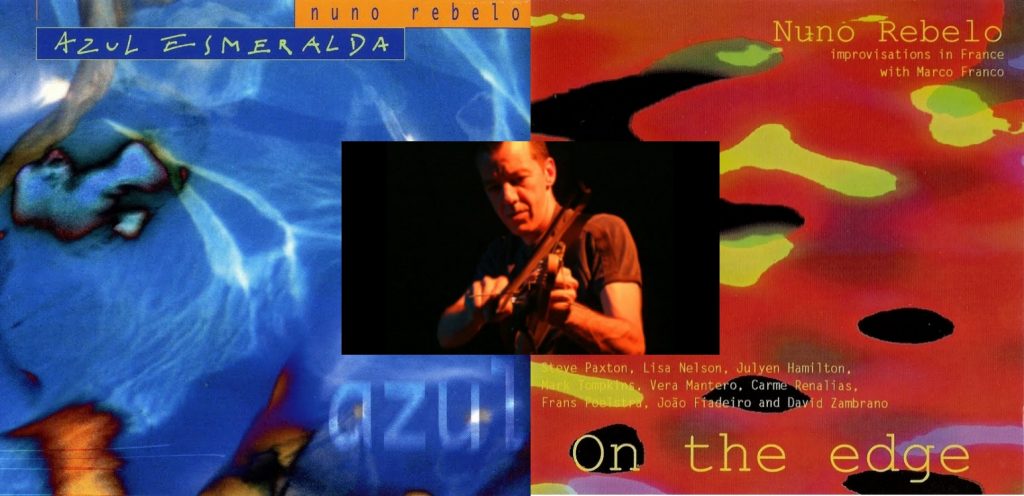When Street Kids were already in the process of disbanding, Nuno Rebelo offered to be GNR’s bass player (Alexandre Soares was leaving and Vítor Rua was going to play guitar). They already had Jorge Romão but Nuno Rebelo still did three shows with the group and participated in the recording of the single “Soul Finger” which would never be released.
He met Jorge Lima Barreto through Vítor Rua and became acquainted with music from all times and places. The project with Mler ife Dada began in 1984 and would only end in early 1991. He was one of the most active elements in the compilation “Divergências”, by Ama Romanta, contributing with a solo song, “Nipsha”, and with the Mler ife Dada song. He produced the songs for Anamar, SPQR and Essa Entente and participated as a musician in the songs “Dim” and the improvised music piece “Situação Aparente”.
In 1988, at the invitation of the Manobras Cultural Association, he composed an electronic “symphony” for the 3rd “Manobras de Maio” fashion show. The double album “Rite of the Month of May (1st False Symphony)”, his solo work, was released in 1989 through EMI-Valentim de Carvalho. Plopoplot Pot started in 1991. The group, now without Vítor Rua, won the 1st Lisbon City Council Competition. They appear on El Tatu’s compilation “Em Tempo Real”. The group was formed by Nuno Rebelo (bass), Paulo Curado (saxophone), Rodrigo Amado (saxophone), Luís Areias (guitar) and Bruno Pedroso (drums).
In 1992, he formed the Polyploc Orkeshtra with his students, which performed live the soundtrack to Murnau’s “Nosferatu”. They were also invited by the Cinema Institute to compose music for the restored version of the film “Douro, Faina Fluvial” by Manoel de Oliveira. Nuno Rebelo also collaborates with João Peste on the project “Alix on the Island of Dreams”. In 1993 he was the author of the official theme for “Lisbon 94 – European Capital of Culture”.
The theme won the advertising award for “best jingle” that year. In 1996, “M2” was released with the soundtrack of the choreography “Sábado 2” by Paulo Ribeiro and the play “Minimal Show”. He is also the author of “Pangea”, the official theme song for Expo 98. He creates a website where he offers music in MP3 format. The page with information about his solo career and the groups he was part of also included the “Plopoplotexts”, “programmatic” texts written for the group Plopoplot Pot.
In 1998 he composed the music for the play “And in the Interval Anything Can Be Done” by José Wallenstein. Presents the show “The Mutant Portuguese Guitars”, at the “Diving into the Future” festival. He also participates in the album “Seven Incantations” by Japanese artist Hiroshi Kobayashi. Also in 1998, the soundtrack for the choreography “Azul Esmeralda” by Paulo Ribeiro was released. He created the music and sound design for the show “Oceans and Utopias”, by François Confino and Philippe Genty, presented at the Utopia Pavilion during Expo 98.
The piece “remiXamor” by choreographer Mark Tompkins, with a soundtrack by Nuno Rebelo, premiered in June 2000 at the Festival de Nouvelles (France). Performs live with the collective L.I.P. (Lisbon Improvisation Players). He is the author of the original music for the choreography “How to roll happily over an inner void” by Vera Mantero. The show “Compact Disconcert”, with musical conception and direction by Nuno Rebelo and stage direction by Paulo Ribeiro and José Wallenstein, is presented at the Teatro Nacional S. João (Porto) on June 21st and 22nd, 2001. In this show he revisits his entire career as a composer for theater and dance.
He creates the Raka publishing house. Through this record label, the albums “Live at ZDB” by the trio Nuno Rebelo+Kato Hideki+Marco Franco and “On the Edge” by Nuno Rebelo and Marco Franco were released. In 2002, the album “Compact Disconcert” was released, revisiting his career as a composer for theater and dance.





